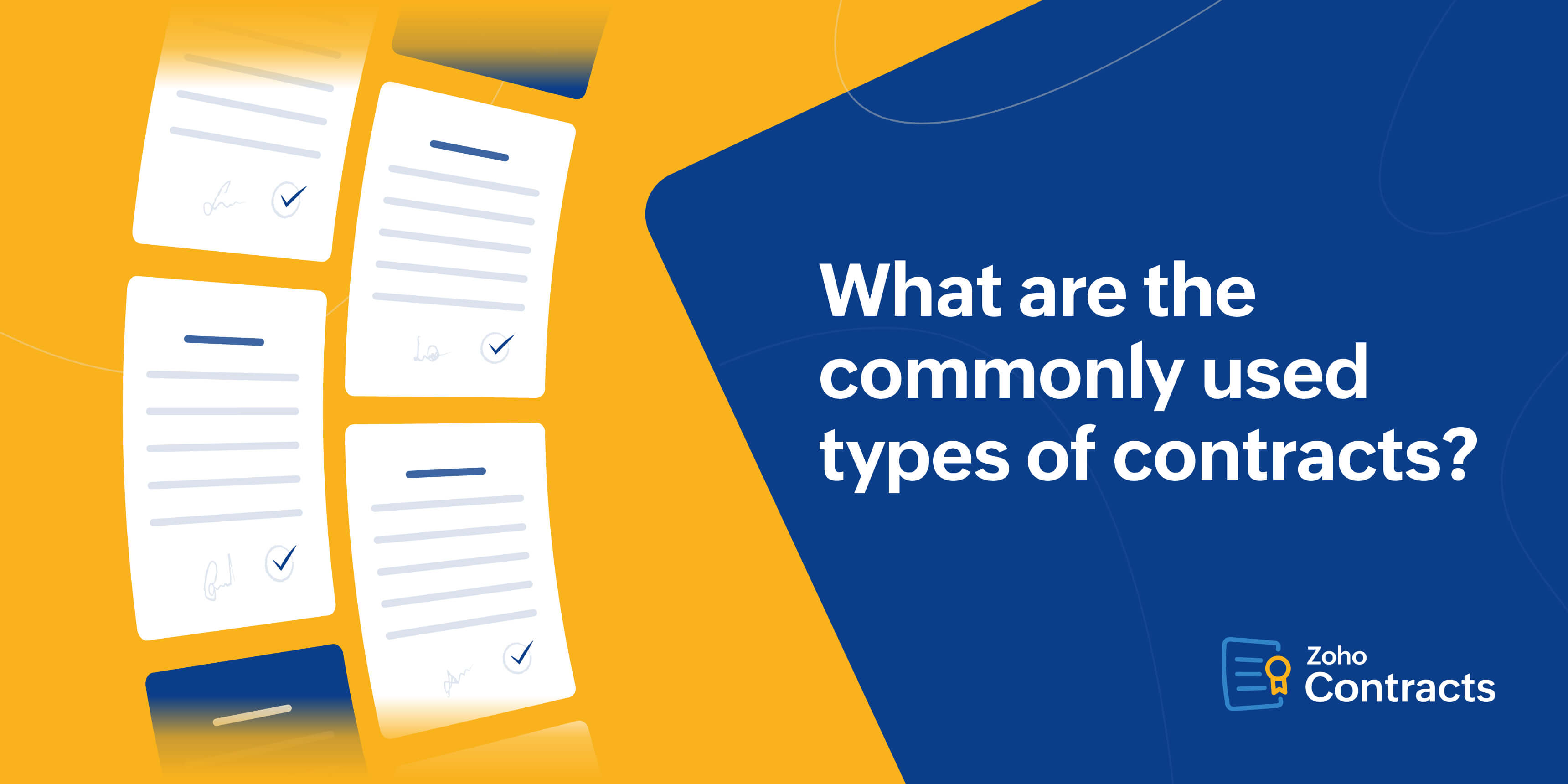- HOME
- Contract Management
- Common types of contracts
Common types of contracts
- Last Updated : July 29, 2024
- 1.0K Views
- 5 Min Read

What is a contract?
A contract is a legally binding document between two or more parties. It’s typically a written document outlining the parties' rights and obligations. Contracts are fundamental to personal and business transactions, providing a framework for the exchange of goods and services.
What is the need for a contract?
Contracts are the building blocks of any commercial transaction and are an indispensable part of any business. A contract:
Establishes clarity and understanding because it serves as a blueprint that outlines the rights and responsibilities of the involved stakeholders. This eliminates ambiguity, ensuring everyone is on the same page.
Serves as a documented reference point for settling any disputes. It acts as evidence in court or mediation, facilitating a swifter resolution.
Provides a legal framework that protects the rights of the involved parties. In the event of a breach of contract by one party, other parties can seek legal remedies such as damages, specific performance, or cancellation of the contract.
Helps companies stay in line with regulatory requirements, boosting compliance.
Holds parties accountable for their promises and actions, promoting trust and confidence.
What makes a contract legally enforceable?
Every contract must have certain essential elements that make it legally enforceable. These include:
Offer and acceptance: One party must propose a deal, also known as an offer, and the other party/parties must explicitly accept the offer.
Consideration: There must be an exchange of value among the involved parties. This could be goods, services, or a promise to do or not do something.
Capacity: Every party entering into the contract must be legally able to enter into the contract and must be of sound mind and legal age.
Legality: The very basis of the contract cannot violate any law or be illegal.
To learn more about the elements of a contract, click here.
What are the different types of contracts?
Contracts can be classified into different types based on their formation, execution, validity, nature, duration, and function.
Formation
Based on how they’re formed, contracts are classified into the following types:
Express contracts: These contracts are formed when either party explicitly states its intention to enter into a contract. The intention could be expressed verbally or in writing.
For example: When you sign a lease agreement or buy a product online.
Quasi contracts: Also known as “implied-in-law” contracts, quasi contracts aren’t true contracts but legal remedies to prevent unjust enrichment. It ensures fairness by preventing someone from benefiting unfairly.
For example, imagine someone mistakenly leaves groceries at your door. You keep them without paying for them, as no agreement requires you to pay for them. In this case, the court can impose a quasi contract, requiring you to pay the owner of the groceries even without a formal agreement.
Implied contracts: These types of contracts are not explicitly stated but inferred by actions or conduct of involved parties.
For example, when you get into a cab, you are implied to pay for the ride.
Performance /execution
Executory contracts: In this type of contract, one or more parties still have obligations to fulfill.
For example: Until the construction of an apartment complex is done, and the payment for the same is made, a construction contract will be executory.
Executed contracts: As the title suggests, this is when all involved parties in an agreement have fulfilled all their obligations.
For example: Once the construction of a building is complete and payment for the same has been made, the contract is considered as executed.
Note: We also use the term “executed” contracts for contracts that are signed and active.
Validity
Valid contracts: These types of contracts contain all the essential elements required for a contract to be legally enforceable.
For example: Signing a non-disclosure agreement when offered a job, or signing a lease agreement for a rental home or apartment.
Void contracts: These contracts are not enforceable from the outset because they involve illegal activities or lack legal capacity.
For example: A contract to sell illegal drugs would automatically be void.
Voidable contracts: While these types of contracts are valid when formed, they can be deemed void by company A when company B involves in fraud, duress, or lack of capacity.
For example: If party A agrees to provide goods to party B for a set price but party B discovers that party A's goods are substandard, party B can sue party A in court and deem the contract to be void.
Nature of the contract
Unilateral contracts: In these types of contracts, only one party makes a promise in exchange for the performance of an act by the other party.
For example: Party A offers a reward for someone finding their lost pet.
Bilateral contracts: These types of contracts involve an exchange of promises between two parties.
For example: Party A agrees to supply goods to Party B, and Party B promises to pay Party A for the same.
Multilateral contracts: These contracts involve three or more parties entering into an agreement. Each party has its own rights and obligations outlined in the contract.
For example: International trade agreements signed between multiple countries.
Duration
Fixed-term contracts: These types of contracts specify a start and end date for the fulfillment of obligations, which is the end of the contract. It can also apply to contracts that have a fixed start and end date.
For example: A rental agreement signed between a house owner and tenant.
Indefinite-term contracts: These types of contracts do not specify an end date. They continue until one of the parties terminates the contract.
For example: Employment contracts signed between an employee and a company.
Function
Indemnity contracts: These contracts involve one party agreeing to compensate the other party or parties for the losses incurred.
Guaranty contracts: Here, one party promises to perform the obligations of the other party or parties if the respective parties fail to do so.
Contracts of adhesion: These types of contracts are also known as boilerplate or standard contracts. They are often presented by one party and accepted by the other without negotiating the contract terms.
Wrapping up
These are some of the common classifications for types of contracts. Empowering yourself with the knowledge of the different types of contracts will help you pick the best one for your needs and aid you in making informed decisions.
You can upload as many contract types you want in Zoho Contracts and customize them.
 Akshaya Ganesh
Akshaya GaneshA journalist turned marketer who loves to travel.


